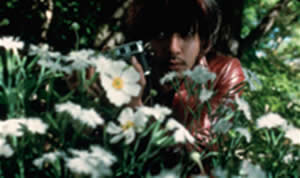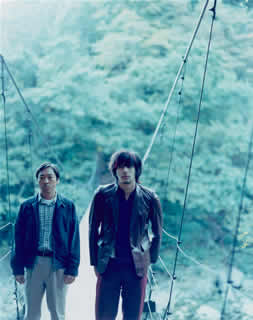 With half the film backdrop set in a courtroom with intense drama, Director Miwa Nishikawa’s, “Sway”, takes the viewer into the life of lead character Takeru (played by Jo Odagiri). Takeru is a trendy Tokyo photographer with a penchant for red leather pants and a pervading coolness. Travelling which is the first theme at the beginning of the film, Takeru receives a disturbing message that his mother has passed away. Readying his items, he takes to the road in his equally stylish retro car for the funeral services.
With half the film backdrop set in a courtroom with intense drama, Director Miwa Nishikawa’s, “Sway”, takes the viewer into the life of lead character Takeru (played by Jo Odagiri). Takeru is a trendy Tokyo photographer with a penchant for red leather pants and a pervading coolness. Travelling which is the first theme at the beginning of the film, Takeru receives a disturbing message that his mother has passed away. Readying his items, he takes to the road in his equally stylish retro car for the funeral services.
Upon settling again in his old town of his youth, Takeru and his father relive the animosity which has been buried in the past and now have been exposed. Takeru’ s older brother, Minoru (Teruyuki Kagawa) is a good natured sibling, who is a polar opposite of the edgy Takeru. We find Minoru running a dilapidated fuel station. Takeru views his return to what the gas station ultimately symbolizes, monotony, routine and the mundaneness he escaped. Despite the freedom looking style he seems to exude, his roots are here. This is the lesson he is faced with again. He cannot escape his past.
Takeru discovers at the station, Cheiko (Yoko Maki), a gas attendant who is taken in by Takeru’s “devil may care attitude” and finds his roughness and slick demeanor irresistible. Desperately seeking to emulate his sense of freedom and despite Chieko’s initial interest in Minoru, she quickly connects with Takeru. The two become lovers and Chieko feels that their connection is enough to follow him. Takeru being essentially a lone wolf with no ties, keeps Chieko at bay.
The film hits the accelerator when the trio head to the woods on an excursion to enjoy nature. Takeru is off taking pictures of flowers and Chieko decides to head to a suspended bridge over the Hasami River (possibly to get a better view of Takeru). Not letting her out of his sight, as Cheiko began to traverse the bridge, Minoru is there to make sure she doesn’t fall. A bit over attentive, Chieko yells at Minoru to keep him away from her. That sets the now downward spiraling Minoru over the edge. Suspecting her tryst with Takeru and her desire to leave him and her life in the country behind, in a flash we see Minoru now on his knees shaking.
What happened to Chieko? We view her shoe float down the river. How did she fall? What missing piece has yet to be discovered? A quick cut to Takeru reveals that he saw from his vantage point the scuffle on the bridge. Racing to console his brother, the authorities are called and both brothers fear the worst to come.
Once the courtroom scenes begin, we commence to recount what happened from several perspectives, pieces come together, lives seem weaved to each other. The brothers rehash their lives and the bond that was once thin becomes strengthened in adversity.
Sway is a heavily character drive film, with Takeru taking the reigns, we are completely subjected to his viewpoints. Through his past history and his self revealing thoughts which cause us to vacillate from the metropolitan life he now lives to the simple life that the country and traditionalism inherently carries. Through the catalyst of his older brother Minoru, Takeru must come to grips with his ailing family life and make straight his path. Strongly reflective, Sway is a film that keeps you gripping to your chair with every passing moment.
* * * *
Weak: 1 Star Average: 2 Stars Good: 3 Stars Very Good: 4 Stars Excellent: 5 Stars

